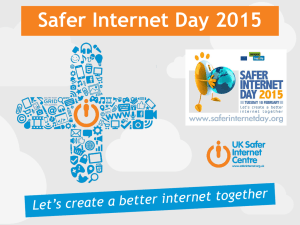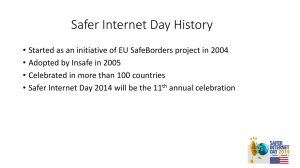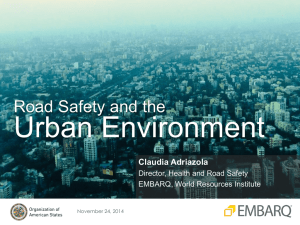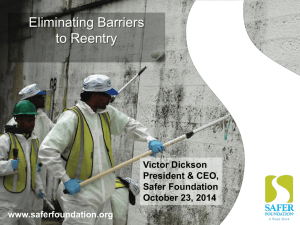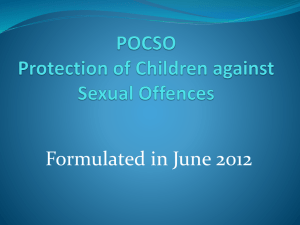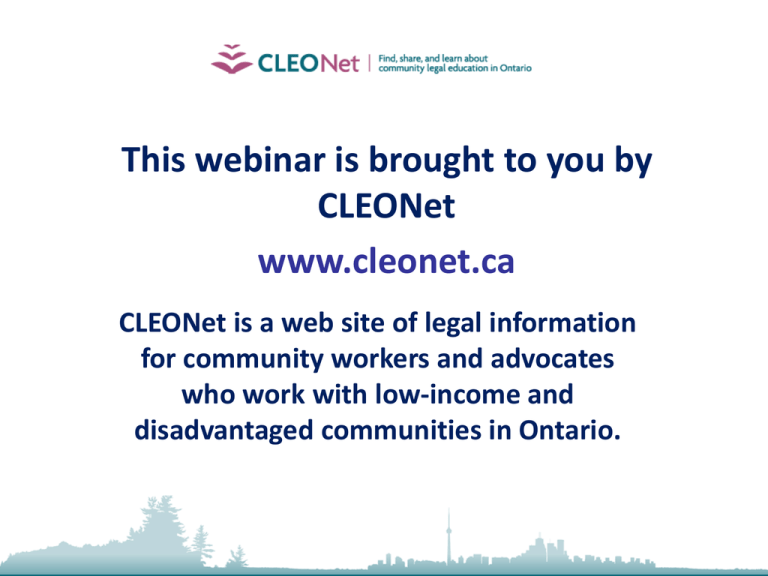
This webinar is brought to you by
CLEONet
www.cleonet.ca
CLEONet is a web site of legal information
for community workers and advocates
who work with low-income and
disadvantaged communities in Ontario.
•2010, Community Law School
(Sarnia-Lambton) Inc.
About our presenter…
Long-time educator, activist and lawyer, Zahra Dhanani is
the Legal Director for the Metropolitan Action Committee
on Violence Against Women and Children (METRAC), an
agency that ensures access to justice for women, youth and
children facing the threat of violence.
Sexual Assault and
Harassment
Presented by:
Zahra Dhanani
Legal Director, METRAC
•"Safer for Women, Safer for Everyone"
Who we are
METRAC
The Metropolitan Action Committee on Violence
Against Women and Children
www.metrac.org
Ontario Women’s Justice Network
www.owjn.org
•"Safer for Women, Safer for Everyone"
Sexual
Assault Court Watch
Sexual Assault and Harrassment
Public Legal Education Materials
Trainings
Public Education
•"Safer for Women, Safer for Everyone"
Today’s Objective
To provide accessible, general information about the
law regarding issues of sexual assault and harassment.
I can answer general questions about the law, but I
CANNOT provide legal advice.
If you require legal advice, we can refer you to
lawyers in practice or legal clinics.
•"Safer for Women, Safer for Everyone"
Today’s Objective
There is NO right or wrong response!
This presentation is not intended to encourage
you to make a particular decision.
Key: access to information to make wellinformed decisions.
Overview
(1) Sexual Assault
•
•
•
•
What is it?
Social context
Law
Legal options
(2) Sexual Harassment
•
•
•
•
What is it?
Social context
Law
Legal options
•"Safer for Women, Safer for Everyone"
(3) Social change
•
•
What can you do to help end
violence against women and
children?
No means No
(4) Resources
Sexual Assault
What is it?
An unwanted sexual act done by one person to
another.
It can include everything from an unwanted kiss or
touch of a sexual nature, to forced penetration, vaginal
or oral.
There does not have to be any physical injury.
Force, threats, intimidation or coercion to engage in
sexual activity that is undesired may be sexual assault.
NO MEANS NO
UNLESS YOU HAVE SAID
YES
THERE IS NO CONSENT
•"Safer for Women, Safer for Everyone"
Social Context
Sexual assault is an equality issue.
Estimated that 1 in 4 women will be sexually assaulted in
Canada during her lifetime.
More than 40% of women report having experienced 1 sexual
assault in their lifetime, this number increases if you add incest
and childhood sexual abuse.
In 2007, over half of victims reported to police were under 18
years old.
Most under-reported crime (approx. 1 in 10 reported).
Victimization occurs in diverse communities, including
LGBTQ communities, women with disabilities, racialized
women and aboriginal women.
•"Safer for Women, Safer for Everyone"
Some Myths and Realities
Myth
Women cannot be raped by men they know.
Reality
The majority of sexual assaults are committed by men against
women they know. It does not matter how well you know
someone, if you do not want to have sexual contact with him and
he makes you, he has sexually assaulted you.
•"Safer for Women, Safer for Everyone"
Some Myths and Realities
Myth
Sexual assaults only happen in “bad” areas and at night.
Reality
Sexual assaults can happen anywhere and at any time. More
than half of sexual assaults take place in someone’s home. Men
who sexually assault women do not discriminate about where they
assault them.
•"Safer for Women, Safer for Everyone"
Some Myths and Realities
Myth
Elderly women and women with disabilities do not get
Raped.
Reality
Sexual assault is a gender-based attack and does not discriminate
based on age, race, religion, sexual orientation, profession and/or
ability. Sexual assault is rooted in power and control, not sex.
•"Safer for Women, Safer for Everyone"
Current News
B.C. girl drugged and gang raped at weekend rave,
and photos of assault posted on Facebook.
In Calgary, police charged a 16 year old boy with
sexually assaulting a 12 year old girl in a school field
in front of their peers.
In Toronto, two women sexually assaulted hours
apart in late August. One of the women was believed
to be homeless.
•"Safer for Women, Safer for Everyone"
The Law
The Criminal Code in Canada
Assault - s. 265
Criminal Harassment (aka. “stalking”) - s. 264
Uttering threats - s. 264.1
Unlawfully causing bodily harm - s. 269
Sexual assault - s. 271
Sexual assault with a weapon, threats to a third party or causing bodily
harm - s. 272
Aggravated sexual assault - s. 273
Meaning of “consent” - s. 273.1
Forcible confinement - s. 279(2)
•"Safer for Women, Safer for Everyone"
The Law
Unless you say “yes,” you have not consented.
Together, your actions, body language and words
can communicate that you are saying “no.”
It does not matter if you have had sex with the
person before, if you are married, or if you are a
sex worker – without your consent, it is sexual
assault.
•"Safer for Women, Safer for Everyone"
The Law
The Criminal Code in Canada
Child Victims
Sexual interference - s. 151 (under 16 years old)
Invitation to sexual touching - s. 152 (under 16 years old)
Sexual exploitation - s. 153 (position of trust or authority)
Sexual exploitation of person with a disability - s. 153.1 (position of trust
or authority)
Incest - s. 155
•"Safer for Women, Safer for Everyone"
Questions
?
•"Safer for Women, Safer for Everyone"
Should I call the police?
If you are in immediate danger: call 911
If you are injured: call 911/go to the hospital
If you are NOT in immediate danger, think about whether
you want to call police
Some women do not report sexual assault to police because of
shame, fears, barriers, revictimization in criminal process, etc.
Criminal process most commonly used legal process
Key: Reporting a sexual assault to the police should be your
own decision
Don’t let anyone push you into reporting it
•"Safer for Women, Safer for Everyone"
The Criminal Justice System
The charges police lay will depend on what law is at
the time of the offence, not what law is now:
Criminal proceedings determine guilt in the legal
sense
•
People who commit sexual assaults are not always found guilty in court
A not guilty verdict does NOT mean that the victim
is lying
•"Safer for Women, Safer for Everyone"
The Criminal Justice System
Reasons why criminal courts don’t always get it right:
• only evidence is one person’s word against another’s
• negative societal myths about sexual assault
When deciding whether to report:
•
•
try not to be intimidated by the system
remember there is a lot of support available, e.g. victims advocates, Crown
attorneys, judges, police officers, and others.
Knowledge is power
•"Safer for Women, Safer for Everyone"
The Criminal Justice System
If contacting police later...
•
•
support person first
Sexual Assault Squad
The charges are then laid by police
The Crown:
•
Crown Attorney represents society, not victim
if Crown wants you to act as a witness, you will receive a subpoena you
must appear in court
meet with the Crown before any hearings
•
•
•"Safer for Women, Safer for Everyone"
The Criminal Justice System
Initial contact with police
describe what happened to you
ask for a break if you need one
you do not need to give the entire report immediately
•"Safer for Women, Safer for Everyone"
The Criminal Justice System
Having a medical exam done is up to you
Advantages
physical evidence that can be used at trial
• tests for pregnancy, STIs
•
Disadvantages
•
physical discomfort and emotional trauma from tests
Try bringing a trusted friend or family member along
•"Safer for Women, Safer for Everyone"
The Criminal Justice System
Medical exam
rape kit
•
vaginal and/or oral examination
search for signs of struggle, bruises, scratches
blood test
•
•
once the exam is completed, the kit becomes police
property
•"Safer for Women, Safer for Everyone"
The Criminal Justice System
Follow up with the police to determine whether
they will investigate your sexual assault claim.
Remember:
DO NOT answer questions about your sexual
history that are not relevant to your claim
Bring support person/s
•"Safer for Women, Safer for Everyone"
The Criminal Justice System
Do not sign your statement unless you agree with
everything written on the page
Charges will be laid if police are satisfied that they
have a case against your attacker
Accused will be in jail until released on bail
•
bail condition: cannot come into contact with you
special conditions
contact police if any of the conditions are broken
•
•
•"Safer for Women, Safer for Everyone"
The Criminal Justice System
you will NOT be an active part of the process
delays for adjournments
it is not necessary to attend preliminary hearings
Victim /Witness Assistance Program (VWAP)
can keep you up to date on what happens
to find the VWAP office nearest you, call the Victim
Support Line toll-free: 1-888-579-2888
•"Safer for Women, Safer for Everyone"
The Criminal Justice System
Limitation period
You can report a sexual assault to the police no matter how long
ago it happened.
They will conduct an investigation to determine whether or not to
lay charges against the person who assaulted you.
Sexual assaults that happened some time ago can be difficult to
prosecute (memories fade, lack of evidence, impossible to locate
offender, policies priorities).
If you want to pursue criminal charges, you should consider
speaking with your local sexual assault centre so you will have an
advocate with you when you go to the police.
•"Safer for Women, Safer for Everyone"
The Trial – Victim’s Personal Information
Sexual
–
history
Can only be raised if directly relevant
•
E.g.: if the victim and the accused have a sexual past
Personal
–
records
Diaries, therapists’ notes
Women and Criminal Law
Requesting the victim’s private records
requires:
The accused to serve all parties (the Crown, the
victim and anyone whose records the defence
wants to see) with a written Notice of
Application in which the accused must set out
what records they want and why
Women and Criminal Law
The Criminal Code requires the judge to consider a number of factors in
deciding whether or not the records should be produced:
the extent to which the record is necessary for the accused to make a full answer and
defence
the probative value of the record
the nature and extent of the reasonable expectation of privacy with respect to the
record
whether production of the record is based on a discriminatory belief or bias
the potential prejudice to the personal dignity and right to privacy of any person to
whom the record relates
society’s interest in encouraging the reporting of sexual offences
society’s interest in encouraging the obtaining of treatment by complainants of sexual
offences, and
the effect of the determination on the integrity of the trial process
Relevance and Records
A list of assertions that might be made by the accused that are
insufficient on their own to warrant production of records:
That the record relates to medical or psychiatric treatment, therapy or
counseling that the complainant or witness has received or is receiving
That the records may disclose a prior inconsistent statement of the
complainant or witness
That the record may relate to the credibility of the complainant or witness
That the record relates to the sexual activity of the complainant with any
person, including the accused
That the record relates to the complainant’s sexual reputation
The Criminal Justice System
General outcomes - verdict
if accused is found not guilty case is over
•
bail conditions are removed
if accused is found guilty
•
case moves to sentencing stage
Victim impact statement
•
only submit after guilty verdict; otherwise subject to disclosure rules and
shared with defence
General outcomes - appeal
Crown or defence can file for appeal within 30 days
•"Safer for Women, Safer for Everyone"
Questions
?
•"Safer for Women, Safer for Everyone"
Criminal Injuries
Compensation Board (CICB)
financial compensation for crime committed against you
if accepted, hearing held (usually)
consideration: medical expenses, lost wages, pain and
suffering
When one person is injured or killed as a result of a violent
crime, the maximum award is $25,000.
must apply within two year of crime, but can seek extension
(esp. if under 18 at time)
perpetrator does NOT need to be convicted or charged,
though better
http://www.cicb.gov.on.ca
•"Safer for Women, Safer for Everyone"
Other Legal Options
Civil Claims
Advantages
• greater chance of success
• monetary rewards
• tell your story in court – victim has more control during
proceedings
Disadvantages
• expensive and lengthy
• regular direct contact with perpetrator
• only if perpetrator has money, e.g. institutions or class actions
•"Safer for Women, Safer for Everyone"
Other Legal Options
Civil claims
•
•
assault, battery, intentional infliction of emotional distress
sue for negligence if led to sexual assault
NO criminal responsibility
Focus: compensating the victim for damages
suffered
NO Crown Attorney Victim and Defendant have
own lawyers
•"Safer for Women, Safer for Everyone"
Other Legal Options
Limitation period
Under the Limitations Act, the basic limitation period
of two years does not apply to claims based on sexual
assault.
There is no limitation period for a claim if, at the
time of the sexual assault, one of the parties to it was
in a position of trust or authority in relation to the
claimant.
•"Safer for Women, Safer for Everyone"
Other legal options
Workplace Assault
If your assault occurred at work, you may pursue a claim
through
• your union
• Canada Human Rights Commission
• Ontario Human Rights Tribunal
• Ministry of Labour – Bill 168
• internal workplace mechanisms
• sue your employer in civil court for vicarious liability
these do NOT replace a criminal charge
•"Safer for Women, Safer for Everyone"
Other legal options
Assaulted by a Professional
e.g. doctor, therapist, teacher
courts will consider power relationships
file a complaint with professional administrative board,
e.g. The College of Physicians and Surgeons of Ontario
counselling, suspension, revoke right to work
whether or not criminal charge filed
•"Safer for Women, Safer for Everyone"
Questions
?
•"Safer for Women, Safer for Everyone"
Sexual Harrassment
90% of all women working
outside of the home will
experience sexual harassment at
some point in their working
lives.
•"Safer for Women, Safer for Everyone"
Sexual Harassment
What is it?
Discrimination based on sex.
An unwanted conduct or comments of a sexual nature in
public environments, e.g. school, work, etc.
It does not always have to be of a sexual nature.
It may include harassing conduct or comments made to an
individual because of their gender.
There does not have to be an intention to discriminate.
•"Safer for Women, Safer for Everyone"
Social Context
Sexual harassment and sexual assault share the
same social realities of gender inequality.
Often relates to an attempt to assert power
Relationships of power are particularly evident in
employment settings.
Victimization also occurs in diverse communities,
including LGBTQ communities, women with
disabilities, racialized women and aboriginal
women.
•"Safer for Women, Safer for Everyone"
Recent News
B.C. human rights tribunal will hear a complaint
from bartender who says she was forced to dress
a certain way, and have hair and make-up done
with “sex appeal.”
Two women made sexual harassment claims
against former Penguin Canada President, David
Davidar.
•"Safer for Women, Safer for Everyone"
The Law
In Canada, sexual harassment falls under human
rights law in the Canadian Human Rights Act (CHRA)
and the provincial Human Rights Code, e.g. Ontario
Human Rights Code (OHRC).
To pursue a claim under the CHRA, you must apply
to the Canadian Human Rights Commission.
To pursue a claim under the OHRC, you must apply
to the Human Rights Tribunal of Ontario.
•"Safer for Women, Safer for Everyone"
The Law
OHRC applies to matters within provincial (not
federal) jurisdiction.
OHRC provides protection in five areas of social
interaction:
•
services, goods and facilities
occupancy of accommodation
contracts
employment
•
membership in vocational associations, e.g. trade unions
•
•
•
•"Safer for Women, Safer for Everyone"
The Law
Code provisions attempt to create climate of
understanding, respect and dignity
Fundamental human right: Code establishes right
to equal treatment without discrimination based on
sex.
Other prohibited grounds, e.g. race, disability, marital
status, may be interlock with issues of gender.
•"Safer for Women, Safer for Everyone"
The Law
The definition of harassment under section 10
(1) of the Code:
“harassment” means engaging in a course of vexatious
comment or conduct that is known or ought reasonably to
be known to be unwelcome.
•"Safer for Women, Safer for Everyone"
The Law
Course of vexatious comment or conduct
more than one event
but, one incident could be significant or enough to create a “poisoned
environment”
Poisoned environment
relates to impact of discriminatory and harassing conduct or comments
Ought reasonable to be known to be unwelcome
subjective and objective elements
considers knowledge of behaviour by harasser, and by reasonable third
party (objective standard must reflect full substantive equality)
•"Safer for Women, Safer for Everyone"
The Law
More examples include, but are not limited to:
unwanted physical contact
suggestive comments or innuendoes
gender-related comments about physical traits
gender-related verbal abuse or intimidation
gender-related jokes
leering or inappropriate staring
demands for dates or sexual favours
displaying sexually offensive materials
•"Safer for Women, Safer for Everyone"
Remedies
A claim may be filed under Part 1 or section 12
(discrimination by association) of the Code
The purpose of the Code is to eliminate discrimination
and provide redress, not to find fault.
restore claimant to position they would have had if Code not
violated, e.g. compensation for mental anguish, loss of wages or
opportunities, etc.
• public interest remedy, e.g. establishing/changing workplace
policies, implementing mandatory anti-harassment training, etc.
•
•"Safer for Women, Safer for Everyone"
Filing a claim
Limitation period
within one year after incident, or
after a series of incidents, within one year after
the last incident
may apply after limitation period if Tribunal
satisfied delay incurred in good faith and no
substantial prejudice will result to any parties
•"Safer for Women, Safer for Everyone"
Cont’d ……
Disabled women, Foreign, immigrant and refugee
women workers more vulnerable due to:
● fear of job loss
● lack of access to information and
● linguistically/culturally accessible resources
Discrimination in the workplace environment clearly
increases chances of other forms of workplace
violence and harassment.
•"Safer for Women, Safer for Everyone"
Social Change
What can you do to help end violence against
women and children?
Law and policy reform
Institutional change
Anti-oppressive action
Think about what is happening in your
community!
•"Safer for Women, Safer for Everyone"
Questions
?
•"Safer for Women, Safer for Everyone"
Resources
Assaulted Women's Help Line: 1 866 8630511
Victim Support Line toll-free: 1-888-579-2888
Ontario Network of Sexual Assault/Domestic
Violence Treatment Centres: (416)323-6400
Femaide (Francophone crisis line): 1-877-3362433
OWJN.org!!!!
•"Safer for Women, Safer for Everyone"
Resources
More resources online
Ontario Victim Services Secretariat:
http://www.attorneygeneral.jus.gov.on.ca/english/o
vss
Human Rights Tribunal of Ontario: www.hrto.ca
Human Rights Legal Support Centre:
http://www.hrlsc.on.ca
Canada Human Rights Commission: www.chrcccdp.ca
•"Safer for Women, Safer for Everyone"
Contact and Referrals
If you have any legal questions or require
referrals, please contact me.
E-mail: legaldirector@metrac.org
Direct line: 416-392-3148
•"Safer for Women, Safer for Everyone"
This webinar was brought to you by
CLEONet
For more information visit the Criminal
Law section of CLEONet at
www.cleonet.ca
For more public legal information
webinars visit:
http://www.cleonet.ca/training

